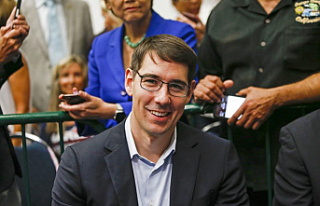Republicans now feel more confident that they can defeat much of the stuff they don't like about the package. The Senate Republican leader Sen. Mitch McConnell said Wednesday that the Democrats couldn't swallow the spinach as they ended the year.
Biden joked about his feelings towards the West Virginia senator who rejected the climate change and social services bills, answering reporters' questions at the White House Tuesday.
Instead, the president spoke passionately to the families that would be benefited from the Democrats' ambitious, but now highly uncertain, plan of investing billions in child care, health services, and other services.
Biden stated, "Senator Manchin is going to get something done,"
As Democrats struggle to make sense of Manchin's weekend announcement that he would not be supporting the bill as it stands, the president's remarks off the cuff are his first public statement. Biden's policy change in the 50-50 Senate was effectively defeated by Manchin, who sided with all Republicans opposing the bill.
Later Tuesday, Senate Majority Leader Chuck Schumer struck a determined tone. He told Senate Democrats via a 90-minute video conference that they can expect to vote on the package in January as they push for a deal.
Many areas of North Carolina are suffering from drought conditions
According to a Democrat who spoke on the private phone, Schumer acknowledged frustrations among Democrats, but he said that the party was not giving up on the proposal.
Youtube video thumbnail
The Democrats are now facing serious questions about whether the $2 trillion initiative could be refashioned to win his critical vote, or if the party will suffer a crushing defeat.
Manchin and his party have become so distant and their relationships are so strained after months of failed negotiations, it is unclear how they will even return to the negotiation table or revive the 2,100-page climate change and social services bill.
McConnell finds all of this encouraging.
The Kentucky Republican said that Schumer had stated last night on a phone call that he wasn't giving up. "I don’t expect him to do that, but the worst part of BBB, according to me, has died," he said.
Biden spoke out forcefully about the economic pressures that make it difficult for parents to pay their bills and the help millions of people could get from the federal government through the legislation. Biden also stated that his package would reduce inflationary pressures, and pointed out analyses that suggested it would increase the economy.
Biden stated, "I want things to get done." "I believe there is still a chance of getting Build Back Better done."
This setback has put Biden's top-ranking legislative effort in deep doubt at a crucial time, closing out his first year as president and prior to the congressional midterm elections, when the Democrats' tenuous hold on Congress is at stake.
Manchin's vote, along with the solid Republican opposition is crucial to this and other initiatives. This includes the priority voting rights legislation by Democrats that Schumer said would be put to an early vote.
Schumer stated Tuesday that if Republicans continue to block voting rights legislation, the Senate would present proposals for changing Senate rules. A Democrat speaking on the video conference said. This is a reference to the long-standing efforts to end or adjust filibuster. Normally, measures must have 60 votes to move forward.
Manchin said that he could not explain the bill to West Virginia constituents, but a union representing coal miners, some of whom are among the 12,000 in his home state, released a statement asking the lawmaker "revisit" his opposition to the package.
President of United Mine Workers of America Cecil Roberts outlined how the package would benefit union members such as those from West Virginia, which is the most dependent on coal in the country.
Some of these provisions would allow coal companies to increase the fee they pay for benefits to victims of black lung, pneumoconiosis or other forms of lung disease. According to the union, the bill would provide tax incentives for manufacturers to build facilities on the coalfields. This could potentially allow miners to be employed after they have lost their jobs.
With Congress currently in recess, Congress is still uncertain about the next steps.
Manchin's desire for a reimagined bill to address a few top priorities and for a longer duration seemed to be of interest to the White House. This was in contrast with the complex and broad House-passed version.
It will be extremely difficult for centrist Democrats and progressive Democrats to restore trust in order to launch a new round of negotiations. Biden has devoted much time of his first year of office to what is now an almost abandoned effort.
This comprehensive package was one of the largest ever considered by Congress. It unleashed billions of dollars to assist American families across the country. Nearly all of it was paid for by higher taxes on corporations, the wealthy, and other income.
It would offer free pre-school and child support for families with children. Subsidies are available for premiums on health insurance, as well as lower prescription drug prices and expanded Medicaid access in those states that don't yet offer it. This bill would create a new program to provide hearing aids for seniors. It also has over $500 billion in carbon emission reductions, which is the largest federal spending ever on climate change.
Biden's party faces a new deadline with the expiration on an expanded child credit. This credit has been sending $300 per month directly to the bank accounts of millions of families. The money will not arrive in January if Congress fails to act.












